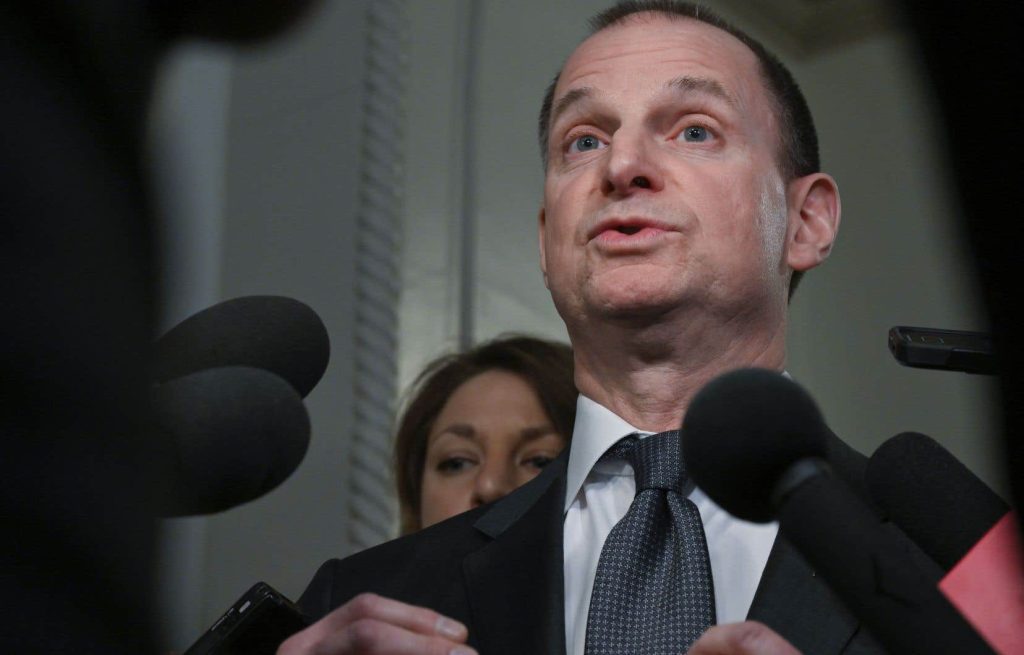
Quebec Finance Minister Eric Girard will present his first budget on Tuesday after the passage of a new law that allows for a maximum three-year postponement of the moment the government stops running the deficit.
The finance minister's office confirmed this week destiny The new version of the Balanced Budget Act will lead to the presentation of a new plan to return to balanced budgets. “This act repeals the old one,” was the response. “Under the new law, due to the deficit in the 2022-2023 public accounts presented on December 11, the government has until the 2025-2026 budget to present this plan. »
As the law sets the duration of plans to return to budget balance at a maximum of five years, the government may decide to extend its deadline to the 2030-2031 financial year, depending on when it will be submitted and for how many years it will take.
In late January, at the end of a meeting of his deputies in Sherbrooke, Prime Minister Francois Legault did not rule out postponing the current target of restoring the budget balance in the 2027-2028 financial year. “It is too early to answer this question,” he replied at a press conference. “We are in the process of doing all the analyses. I have meetings with Eric Girard, and I have others planned in the coming weeks. Be patient for a few months, we will tell you everything in the budget. »
Three hours before, Mr. Girard revealed the financial impact of larger-than-expected pay raises for state employees. “At this stage it's mathematical, the deficits are high,” he explained. Mr. Girard refrained from repeating his government's commitment to restoring the budget balance in 2027-2028, at the end of his plan that would require the suspension of legislation to add two years to the planned five years to reach this goal.
The minister highlighted the downward revision of the Bank of Canada's economic growth forecasts for 2024, in addition to additional raises for state employees. “The economy has practically stopped during periods of stagnation”, he noted.
In its update last November, the Legault government projected a deficit of four billion dollars after paying into the Generation Fund for 2022-2023. It will decrease by one billion per year until it returns to balance in 2027-2028.
There is a possibility of postponement
At the end of November 2023, the government passed the new Balanced Budget Law, which completely replaced the previous one. The text still imposes a five-year limit on eliminating deficits, but it includes relaxations.
In the previous version, it was possible to declare large deficits during the implementation of the plan not exceeding the five years initially planned. The only way to delay the return to balanced budgets is to suspend application of the law. The text adopted in December provides a new reason to postpone this moment when “a less robust economic recovery than expected at the end of an economic slowdown or recession” occurs.
In the Parliamentary Committee, while studying these changes included in the Omnibus Bill, Mr. Girard pleaded for more flexibility. “The application of the current law has proven to be very robust in the face of a significant economic slowdown,” he said. “While maintaining the limitation associated with respecting a balanced budget, certain aspects of the recommendations of this Act must be modified to make its application more simple and flexible. »
During a consultation on the bill, economist Luke Godbout insisted on the importance of setting criteria by which to judge that “the economic recovery is less robust than expected”. A professor from the University of Sherbrooke suggested that part of this could be a more than 25% drop in estimated growth of gross domestic product (GDP). “I think we're starting to see a significant shift,” he told Minister Girard.
A new version of the proposed law was approved last December without specifying the criteria.
Plan or not
Although he chose not to run GDP below his expectations, Mr. Professor Godbout believes Girard can still come up with a new plan. “We give the right to submit a new plan to return to balanced budgets because the old law no longer exists,” the economist explained in an interview.
Despite this, there is a possibility that the minister will continue as planned. “This does not mean that the minister is abandoning the plan, but it means that he is likely to present a new one,” said Mr. Godbout explained. Under the new law, the Legault government will have to wait until next year to come up with a new plan to return to budget balance.
Till 2022 Mr. Girard's cabinet director, Philippe Gauguin, also believes the plan to return to balance by passing new legislation is invalid. The man, who is now a director at consulting firm AppEco, laments that these changes have been received with indifference. “It really went under the radar,” he notes. “But the flexibility he gave himself means he doesn't have to immediately present a plan to return to a balanced budget. It depends on how he interprets his law. »
André Levesque, president of the public policy committee of the Association of Quebec Economists (AEQ), believes the government does not need to cite difficult economic conditions to present a new plan to return to budget balance. “The existing plan, in a way, it's going to disappear because they're going to repeal the old law,” he said.
Mr. participated in the consultation on the bill. Levesque, however, insisted that the matter had not been identified. “It's one thing to give you more flexibility. It's another thing to completely reset the counters from zero. We'll really see what they're going to do. Basically, it's a question of seeing what horizon they give to return to budget balance. »
Hardness or Toughness?
By asserting that state employee salaries would add to the deficit, Mr. Legault justified himself as not wanting to resort to austerity. Mr. Girard promised that these salary increases would increase health and education budgets in particular.
For Philippe Gozian, it is not possible to talk about austerity if the two main missions of the state are preserved. This lesson was learned from the economic measures taken by Philippe Couillard's Liberal government, which left their mark. “The Coulard government has written a book or a chapter on what not to do: what it says is not to cut health and education. »
After it was established, Mr. Gozian expects cost increases in other segments to be lower, between 0% and 1%. But he ruled that programs linked to the ministries of family, immigration and the French language should be preserved. According to him, the cuts will be easier in the Ministry of Finance, whose budgets have been increasing in recent years. “Tax measures are very generous. So, at the political level, the consequences affecting the business aid envelopes are really minimal,” he explained.
Luc Godbout, for his part, believes that Minister Girard is in a difficult situation because of the restrictions imposed on him. “The mandate he got from the Prime Minister was like squaring some circle. It's: “You don't have the right to raise taxes, you don't have the right to do austerity, but eliminate this deficit.” » A return to budget balance can only be achieved through spending cuts, the professor opined. “The finance minister is in a strange chair because revenues have to go up,” he explained.
In its pre-budget submission, the AEQ noted that in 2022-2023, spending by departments and agencies in 2022-2023 remained above their pre-pandemic level, although costs associated with COVID-19 ($2.3 billion) were modest. In Quebec, program spending per capita was 14% above the Canadian average in 2022-2023, but the gap was 6% in 2017-2018, the document indicates.
“Unless there is a tremendous improvement in productivity, there will be no growth that will save the day in terms of income,” says André Levesque. “Over the next five years, the rate of growth in expenditure will have to slow down. »





More Stories
6 Shades should not be on your terrace
Housing Crisis: The Stress of Finding Yourself on the Street at 20
Le Rouge Vin officially left the Hotel Gouverneur